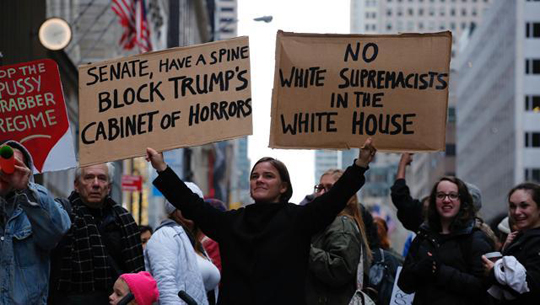New York, Nov 21: At least 300 people, including Beastie Boys singer Adam Horovitz, protested in New York today against what they said were hate crimes inspired by the election of Donald Trump, after swastikas appeared in a Brooklyn park.

The park bears the name of Adam Yauch, a bassist and singer with the Beastie Boys who militated for human rights. The popular group broke up in 2012 following his death of cancer. Yauch had played in the park as a child.
Sometime before Friday morning, vandals used spray paint to draw awkwardly formed swastikas and the words "Go Trump" on a children's locomotive in a playground.
City workers quickly painted over the graffiti, and by today the locomotive had been covered with flowers, hearts, messages of love and Tibetan flags, in tribute to Yauch, who was a Buddhist.
The defacement - of a sort seen in many parts of the country since Trump's shock election, according to the Southern Poverty Law Center (SPLC), which monitors extremism - sparked widespread outrage on social media.
The Beastie Boys, formed in the 1980s by three young Jewish musicians from Brooklyn, were one of the great successes of the hip-hop genre. The surviving Beastie Boys tweeted yesterday: "Hate has no place in Brooklyn, NYC or America. Join us on Sunday to stand against hate messages."
Horovitz was joined by elected officials including New York state senator Daniel Squadron, a Democrat, as well as leaders of several religious communities. Together they sang the "Star Spangled Banner," the US national anthem, an AFP photographer reported.
New York Governor Andrew Cuomo and New York City Mayor Bill de Blasio, both Democrats, have said they will not tolerate hate crimes or expressions of racism, and they announced a series of measures to protect anyone targeted, whether Muslim, Jew, immigrant or member of a sexual minority.
Thus, Cuomo announced today that he was creating a special state-police unit to deal with such crimes.
Having set up a special help line to take calls from potential victims, Cuomo also announced the creation of a fund to help immigrants in need of legal protection.






Comments
Trump Anti Jew , Muslims & Hindu. So all people coming under one stage to protest against trump.
Add new comment